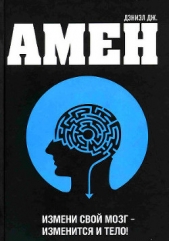Зрелый возраст

Зрелый возраст читать книгу онлайн
Наш мозг в зрелом возрасте не только не увядает, но и сохраняет способность учиться и развиваться — это доказанный современной наукой факт. Интересная, активная и здоровая старость, о которой мечтает каждый, сегодня вполне достижима. Практикующий психотерапевт Генри Эммонс и нейропсихолог Дэвид Олтер рассказывают об уникальных методах оздоровления мозга, упражнениях на остроту ума и о правилах, следуя которым вы будете встречать каждый новый день с радостью. Из книги вы узнаете: как физическая нагрузка влияет на здоровье мозга, эмоции и энергичность; как решать проблемы со сном; как правильное питание действуют на работу мозга; как настроить себя на позитивный лад и о многих других способах, которые позволят в преклонном возрасте быть активными и счастливыми.
Внимание! Книга может содержать контент только для совершеннолетних. Для несовершеннолетних чтение данного контента СТРОГО ЗАПРЕЩЕНО! Если в книге присутствует наличие пропаганды ЛГБТ и другого, запрещенного контента - просьба написать на почту [email protected] для удаления материала
Доктор Олтер — популярный лектор и преподаватель на местных, национальных и международных конференциях и тренингах, охватывающих широкий спектр тем, которые интересны той или иной аудитории. Тренинги под его руководством помогают участникам активировать их телесно-духовные связи, чтобы привнести больше счастья и удовлетворенности в свою жизнь и жизнь окружающих.
С обоими авторами можно связаться через веб-сайт http://www.stayingsharp.org.
Примечания
2. Созданный временем
1. Р. Whitehouse, The.Myth of Alzheimer’s: What You Aren’t Being Told about Today’s Most breaded Diagnosis (New York: St. Martin’s Press, 2008).
2. P. Greenwood and R. Parasuraman, Nurturing the Older Brain and Mind (Cambridge, MA: MIT Press, 2012).
3. R.D. Fields, The Other Brain: From Dementia to Schizophrenia, How New Discoveries about the Brain Are Revolutionizing Medicine and Science (New York: Simon & Schuster, 2009).
4. I. McGilchrist, The Master and His Emissary: The Divided Brain and the Making of the Western World (New Haven: Yale University Press, 2009).
5. http://www.immersionactive.com/resources/50-plus-facts-and-fiction.
6. Pew Research Center for the People and the Press, poll, Dec. 15,2010.
7. Y. Такі et al., “Voxel-Based Morphometry of Age-Related Structural Change of Gray Matter for Each Decade in Normal Male Subjects,” paper presented at the Ninth Annual Meeting of the Organization for Human Brain Mapping, New York City, 2003.
8. E. Goldberg, The Wisdom Paradox (New York: Gotham Books, 2006).
9. P. Greenwood and R. Parasuraman, “Ameliorating Cognitive Aging: A Neurocognitive Framework,” chap. 4 in Nurturing the Older Brain and Mind (Cambridge, MA: MIT Press, 2012).
10. Greenwood and Parasuraman, p. 5; Goldberg, p. 11.
11. D. Snowdon et al., “Linguistic Ability in Early Life and Cognitive Function and Alzheimer’s Disease in Later Life" JAMA 275, no. 7 (1996): 528-33.
3. Сила внимания
12. D.J. Simons and C.F. Chabris, “Gorillas in Our Midst: Sustained Inattentional Blindness for Dynamic Events,” Perception 28, no. 9 (May 1999): 1059-74.
13. E.R. Graham and D.M. Burke, “Aging Increases Inattentional Blindness to the Gorilla in Our Midst,” Psychology and Aging 26, no. 1 (Mar. 2011), 162-66.
14. G. Mark et al., “The Cost of Interrupted Work: More Speed and Stress,” Proceedings of the SIGCHI Conference on Human Factors in Computing Systems (2008): 107-10.
15. C. Woolston, “Multitasking and Stress,” HealthDay (Mar. 2013): http://cosumer. healthday.com/encyclopedia/article.asp? AID= 646052.
16. Quoted by C. Rosen, “The Myth of Multitasking,” The New Atlantis 20 (Spring 2008): 105-10.
17. E. Ophir et al., “Cognitive Control in Media Multitaskers,” Proceedings of the National Academy of Sciences of the United States of America 106, no. 37 (Sept. 15,2009): 15583-87.
18. P. Grossman et al., “Mindfulness-Based Stress Reduction and Health Benefits: A Meta-Analy sis,” Journal of Psychosomatic Research 57, no. 1 (2004): 35-43.
19. N.E. Morone et al., “Mindfulness Meditation for the Treatment of Chronic Low Back Pain in Older Adults: A Randomized Controlled Pilot Study,” Pain 134 (2008) : 310-19.
20. H. Cramer et al., “Mindfulness-Based Stress Reduction for Breast Cancer: A Systematic Review and Meta-Analysis,” Current Oncology 19, no. 5 (2012): 343-52.
21. R.J. Davidson et al., “Alterations in Brain and Immune Function Produced by Mindfulness Meditation,” Psychosomatic Medicine 65 (2003): 564-70.
22. J.D. Creswell et al., “Mindfulness Meditation Training Effects on CD4+ T Lymphocytes in HIV-1 Infected Adults: A Small Randomized Controlled Trial,” Brain, Behavior, and Immunity 23, no. 2 (Feb. 2009): 184-88.
23. M. Killingsworth, “Does Mind-Wandering Make You Unhappy?,” Greater Good, July 16, 2013, http://greatergood.berkeley.edu/article/item/does mind wandering make you unhappy.
24. W. Hasenkamp et al., “Mind Wandering and Attention during Focused Meditation: A Fine-Grained Temporal Analysis of Fluctuating Cognitive States,” Neuro-Image 59 (2012): 750-60.
25. W. Hasenkamp, “How to Focus a Wandering Mind,” Daily Good, July 17, 2013. http://greatergood.berkeley.edu/article/item/how to focus a wandering mind.
26. F. Zeidan et al., “Mindfulness Meditation Improves Cognition: Evidence of Brief Mental Training,” Consciousness and Cognition, 19, no. 2 (June 2010): 597-605.
27. L. Bylsma et al., “A Meta-analysis of Emotional Reactivity in Major Depressive Disorder,” Clinical Psychology Review, 28, no. 4 (Apr. 2008): 676-91.
28. J. Lutz et al., “Mindfulness and Emotion Regulation — an fMRI Study,” Social Cognitive and Affective Neuroscience, doi:10.1093/scan/nst043 (first published online Apr. 5,2013).
29. E. Luders et al., “The Underlying Anatomical Correlates of Long-Term Meditation: Larger Hippocampal and Frontal Volumes of Gray Matter,” Neuroimage, 45 (2009) : 672-78.
30. Е. Luders, quoted by M. Wheeler in “How to Build a Bigger Brain,” UCLA News, May 12, 2009, http://newsroom.ucla.edu/portal/ucla/PRN-how-to-build-a-bigger-brain-91273.aspx.
31. J. Johnson, H. Emmons, et al., “Resilience Training for Depressed and Stressed Healthcare Professionals,” Jan. 2014 (submitted for publication).
4. Мозг любит движение: шаг первый
32. В. Winter et al., “High-Impact Running Improves Learning,” Neurobiology of Learning and Memory 87, no. 4 (2007): 597-609.
33. J.S. Snyder et al., “The Effects of Exercise and Stress on the Survival and Maturation of Adult-Generated Granule Cells,” Hippocampus, Epub ahead of print (Jan. 20.2009): 1-9, doi:10.1002/hipo.20552.
34. S. Vaynman and F. Gomez-Pinilla, “License to Run: Exercise Impacts Functional Plasticity in the Intact and Injured Central Nervous System by Using Neurotrophins," Neurorehabilitation and Neural Repair 19, no. 4 (2005): 283-95.
35. http://www.cdc.gov/physicalactivity/everyone/guidelines/adults.html.
36. Center for Disease Control and Prevention, “One in Five Adults Meets Overall Physical Activity Guidelines,” Press Release, May 2,2013, http://www.cdc.gov/ media/releases/2013/p0502-physical-activity.html.
37. N. Mischel et al., “Physical (In)activity-Dependent Structural Plasticity in Bulbospinal Catecholaminergic Neurons of Rat Rostral Ventrolateral Medulla,” Journal of Comparative Neurology 522, no. 3 (Feb. 15,2014): 499-513.
38. A. Gow et al., “Neuroprotective Lifestyles and the Aging Brain: Activity, Atrophy, and White Matter Integrity,” Neurology 79, no. 17 (Oct. 2012): 1802-8.
39. K.I. Erickson et al., “Exercise Training Increases Size of Hippocampus and Improves Memory,” Proceedings of the National Academy of Sciences 108, no. 7 (Feb. 15,2011): 3017-22.
40. J. Mota-Pereira, J. Silverio, et al., “Moderate Exercise Improves Depression Parameters in Treatment-Resistant Patients with Major Depressive Disorder,” Journal of Psychiatric Research 45, no. 8 (Aug. 2011).
41. J.B. Bartholomew et al., “Effects of Acute Exercise on Mood and Well-Being in Patients with Major Depressive Disorder," Medicine and Science in Sports and Exercise 37, no. 12 (2005): 2032-37.
42. Alzheimer’s Association, “2013 Alzheimer’s Disease Facts and Figures,” http:// www.alz.org/downloads/facts figures 2013.pdf, accessed Jan. 25,2014.
43. G. Small et al., “Healthy Behavior and Memory Self-Reports in Young, Middle-Aged, and Older Adults,” International Psychogeriatrics 25, no. 6 (June 2013): 981-89.
























